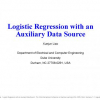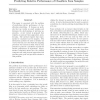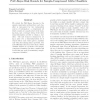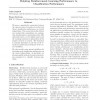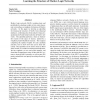114
Voted
ICML
2005
IEEE
16 years 3 months ago
2005
IEEE
We consider support vector machines for binary classification. As opposed to most approaches we use the number of support vectors (the "L0 norm") as a regularizing term ...
92
Voted
ICML
2005
IEEE
16 years 3 months ago
2005
IEEE
We introduce a family of kernels on discrete data structures within the general class of decomposition kernels. A weighted decomposition kernel (WDK) is computed by dividing objec...
80
Voted
ICML
2005
IEEE
16 years 3 months ago
2005
IEEE
103
Voted
ICML
2005
IEEE
16 years 3 months ago
2005
IEEE
This paper is concerned with the problem of predicting relative performance of classification algorithms. It focusses on methods that use results on small samples and discusses th...
117
Voted
ICML
2005
IEEE
16 years 3 months ago
2005
IEEE
This paper presents an algorithm to estimate simultaneously both mean and variance of a non parametric regression problem. The key point is that we are able to estimate variance l...
83
Voted
ICML
2005
IEEE
16 years 3 months ago
2005
IEEE
We extend the PAC-Bayes theorem to the sample-compression setting where each classifier is represented by two independent sources of information: a compression set which consists ...
128
Voted
ICML
2005
IEEE
16 years 3 months ago
2005
IEEE
We prove a quantitative connection between the expected sum of rewards of a policy and binary classification performance on created subproblems. This connection holds without any ...
121
Voted
ICML
2005
IEEE
16 years 3 months ago
2005
IEEE
We consider online learning where the target concept can change over time. Previous work on expert prediction algorithms has bounded the worst-case performance on any subsequence ...
89
Voted
ICML
2005
IEEE
16 years 3 months ago
2005
IEEE
The aim of this paper is to show that machine learning techniques can be used to derive a classifying function for human brain signal data measured by magnetoencephalography (MEG)...
113
Voted
ICML
2005
IEEE
16 years 3 months ago
2005
IEEE
Markov logic networks (MLNs) combine logic and probability by attaching weights to first-order clauses, and viewing these as templates for features of Markov networks. In this pap...

